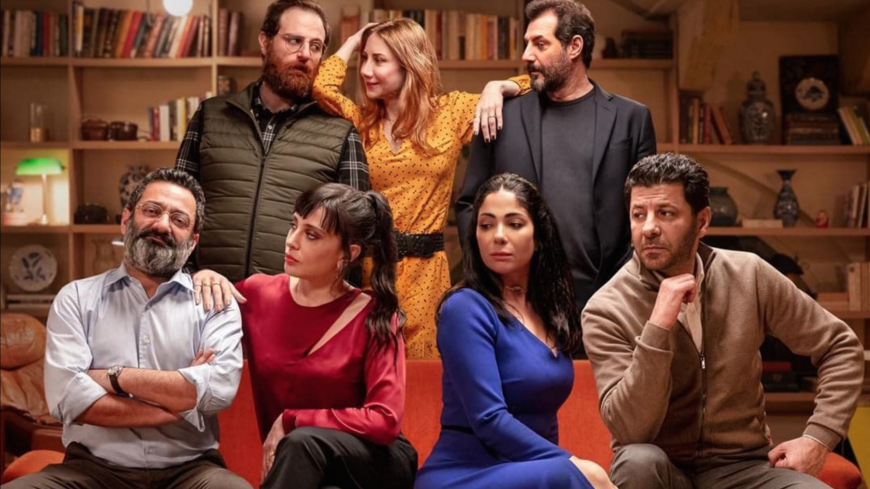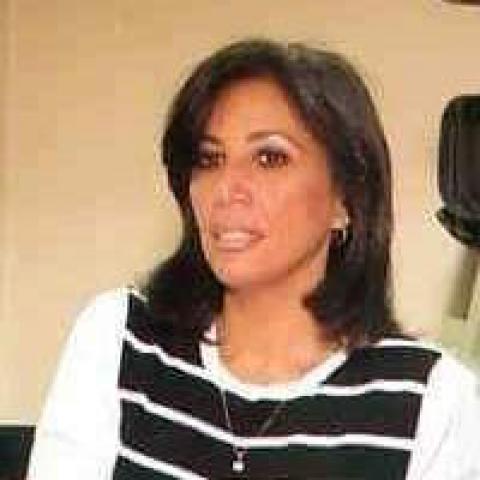Netflix's first Arabic-language original film "Perfect Strangers" ("As-hab wala A'az" in Arabic, literally "Friends or Dearer") has sparked an uproar in Egypt, with the reactions raising concern among secularists about growing fundamentalism in society.
Within days of its launch Jan. 20, the film, the latest in a string of international adaptations of the 2016 Italian comedy drama under the same name, came under fire from conservatives on social media with some accusing Netflix of "seeking to spread deviant ideas" and of trying to normalize them. Meanwhile, supporters defended the right of viewers to choose what they watch; others argued that those who deny that vices exist in our society are like ostriches burying their heads in the sand.
The film's plot revolves around seven friends who during a dinner party decide to play a game that involves placing their cellphones on the table and making all their incoming calls and text messages public. Many dark secrets are subsequently revealed: A wife who is chatting online with male strangers is exposed and one of the attendees comes out as gay.
The public debate on the film has spilled over from social media into the mainstream local media. During her show's broadcast Jan. 25 on the Saudi-owned MBC Masr, TV presenter Eman Reyad sounded genuinely alarmed that her seven-year-old son had asked her what the word "gay" means. Her guest, a life coach, responded by saying it was no cause for concern. She advised her to explain to her son that there are different sexual orientations.
Egyptian lawyer Ayman Mahfouz has threatened legal action against the Ministry of Culture if the latter fails to ban the film from being screened in Egypt.
"The film spreads poison in society through scenes and offensive language that go against our morals and values," Mahfouz said. He told Al-Monitor that the film "promotes homosexuality and attempts to impose abhorrent values and morally repugnant behavior on our society."
He has also filed a legal complaint with the public prosecutor's office against the film's co-producer Mohamed Hefzy, accusing the latter of "seeking to destroy family values through his films."
Mahfouz noted that Hefzy was also the screenwriter and co-producer of the equally controversial film "Feathers" that had sought "to tarnish Egypt's reputation through its depiction of poverty."
"Feathers," a comedy drama, won the Critics Award at last year's Cannes Film Festival where it premiered and the Best Feature Narrative Award at the Gouna Film Festival last October. During the screening of "Feathers" in the Red Sea resort of Gouna, several actors had walked out in protest at the film's "negative portrayal of Egypt." Sherif Mounir, one of the actors who walked out, later told MBC Masr that the film had gone too far in its depiction of slum areas, portraying Egypt "in a negative light."
Members of the artistic community threw their weight behind Egyptian actress Mona Zaki who has been slammed by critics in recent days over a scene in the film in which she is shown taking off her underwear and shoving it into her purse before leaving the house. In a tweet expressing solidarity with Zaki and her husband Ahmed Helmi who has also borne the brunt of the public outrage over the film, film director Amr Salama wrote, "We vow to continue to strive for freedom of expression and creativity no matter how much they [the conservatives] resist it."
In comments published on his official Facebook page, novelist Youssef Zeidan described the public outcry as "outrageous."
"We have reached the pit of absurdity … denunciations of the film have gone viral but those same critics have not objected to the closure of The Atelier of Alexandria that had operated for decades," he wrote in reference to the Alexandria-based gallery that since its establishment in 1934 had served as a space for cultural debates, art exhibitions and film screenings.
Zeidan continued, "This [the uproar] is yet another sign of the general state of stupidity and is testament to the shallowness that has followed the dissolution of the political Islam project and the failure of artistic, intellectual and literary efforts to fill the existing void."
In a statement published on its official Facebook page, the Syndicate of Acting Professions insisted that it protects freedom of creativity and artistic expression and will not stand idly by in the face of verbal attacks, intimidation or psychological terrorization of any Egyptian artist for his/her artistic works.
It read, "The role of art and soft power is to tackle controversial issues and sound the alarm on the many (dangerous) phenomena that leak into our society. Egyptian artists must counter and expose such phenomena through their works and alert the public as this is the role of art in general and actors in particular."
Film critic Tarek El Shennawi argued that the commotion over the film has highlighted "the ongoing tug of war between seculars and ultra-conservatives for the country's future." He suggested countering "foreign influences with ideas."
"The hullabaloo over the film is uncalled for," he told Al-Monitor. "Opponents think they can ban a Netflix production but this is naive. What we should do instead is produce films that truly represent our family values and allow international audiences to see them."
Shennawi noted, "Conservatives who falsely claim that homosexuality and infidelity do not exist in Arab societies are burying their heads in the sand. The radical voices belong to a segment in society that seeks to impose its religious and cultural values and ideals on others and that can neither accept nor tolerate different and more liberal views."
Award-winning novelist Alaa al-Aswany dismissed the widespread criticism of the film as "an attempt [by the government] to deflect public attention from more pressing issues." He told Al-Monitor that the authorities want to divert public attention away from their economic woes and other internal challenges such as an expected further rise in prices and a shortage of liquidity in the banking system.
Aswany, a government critic whose best-selling book "The Yacoubian Building" has been translated into several languages and was made into a film of the same name in 2006, lives in self-imposed exile in New York where he teaches an online creative writing course. "The Yacoubian Building," the first Egyptian film to break the homosexuality taboo by featuring an openly gay character, may have never reached local cinemas if Hatim, the gay newspaper editor, had not been beaten to death by his male lover toward the end of the film. His murder was likely seen by the censors as a fitting punishment for his immoral deeds.
Unlike Hatim in "The Yacoubian Building," the gay character in the film "As-hab Wala A'az" is portrayed in an affirmative light and wins the sympathy of some of his friends, a cause for alarm among Egypt's politicians.
In an urgent appeal to the speaker of the House of Representatives, Mahmoud Kassem, a member of parliament from the pro-government Future of the Nation party, called for the banning of the film in Egypt for its "controversial content" that he said "runs counter to Egyptian morals" and "promotes homosexuality."
Mostafa Bakri, another deputy leading the cavalry in parliament, suggested that the film's release was "part of a plot to disrupt Egyptian and Arab societies " and "destroy family values."
The homophobic rant is neither new nor surprising in a country where homosexuality is generally frowned upon and where members of the LGBTQ community face systemic persecution and are frequently detained under the country's anti-blasphemy laws on the charge of "fomenting strife" and "spreading immorality."
What's new perhaps is that Egyptians are now publicly debating previously taboo issues such as homosexuality and extra-marital relations.







